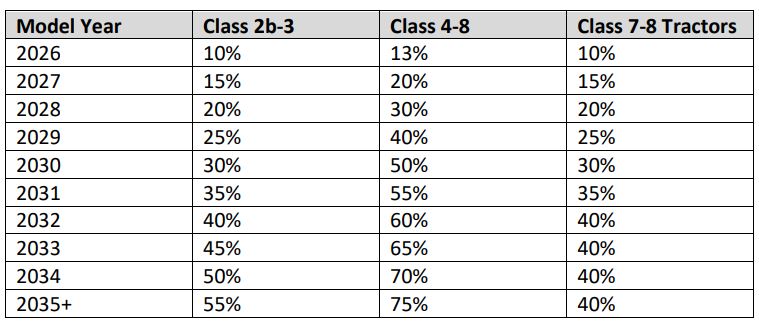Rhode Island adopts California’s strict truck emission standards
Rhode Island is the latest state to adopt California’s Advanced Clean Trucks emission standards.
On Wednesday, May 10, Gov. Dan McKee announced that Rhode Island will join several other states in adopting California’s strict emission standards, Advanced Clean Cars II and Advanced Clean Trucks.
According to the Advanced Clean Trucks emission standards, manufacturers who certify Class 2b-8 chassis or complete vehicles with combustion engines would be required to sell zero-emission trucks as an increasing percentage of their annual Rhode Island sales from 2024 to 2035. By 2035, zero-emission truck/chassis sales would need to be 55% of Class 2b-3 truck sales, 75% of Class 4-8 straight truck sales, and 40% of truck tractor sales.

“The Act on Climate put us on the clock for meeting major carbon reduction mandates, and it’s clear to me that Rhode Island will only meet the mandates by addressing the transportation sector head-on,” Gov. McKee said in a statement. “Implementing the Advanced Clean Cars II and Advanced Clean Trucks policy will help us do exactly that, minimize smog across the state but especially in environmental justice communities, and ensure adequate customer choice on electric vehicles in the future.”
Advanced Clean Trucks applies only to manufacturer sales. It does not apply to used cars or local dealerships and customers.
On May 18, Rhode Island’s Department of Environmental Management plans to hold a virtual public listening session on the new rules, which are referred to as “Rhode Island’s Low-Emission and Zero-Emission Vehicle Programs” regulation. Comments can be submitted through May 24 by clicking here.
California is the only state allowed to impose emission standards that are stricter than federal standards per the Clean Air Act. Once the Golden State approves of stricter emission standards, it must receive the approval of the U.S. Environmental Protection Agency.
In 2020, the California Air Resources Board approved the Advanced Clean Trucks emission standards. In March, the EPA granted California’s request for waivers of preemption, essentially giving the state the green light to move ahead with the new truck emission standards.
Once California receives the EPA’s stamp of approval, other states are allowed to adopt similar emission standards. Other states that adopted the Advanced Clean Trucks rule include Colorado, Massachusetts, New Jersey, New York, Oregon, Vermont and Washington. Connecticut, Maryland, Maine, North Carolina, Pennsylvania and Virginia all have a memorandum of understanding on the books that paves the way for adopting California’s truck emission standards.
Trucking stakeholders say ‘not so fast’
Several stakeholders, including the Owner-Operator Independent Drivers Association, the Rhode Island Trucking Association and the Truck and Engine Manufacturers Association, have expressed their concerns regarding stricter truck emission standards.
“RITA has long been in dialogue with the state leaders on this issue,” RITA President Chris Maxwell told Land Line in a statement. “We are unaware that they have a plan to address the far more complex challenges of commercial viability, but hope they do include our industry’s valuable expertise as they attempt to implement in the real world.”
The Owner-Operator Independent Drivers Association has long argued that truckers also want a cleaner environment but the technology must be reliable and cost-effective.
“This is another example of California approving onerous regulations that increase operating costs for truckers within the state,” said Jay Grimes, OOIDA director of federal affairs. “Whether it’s CARB emission requirements or misguided legislation like AB5, it’s no surprise we’re seeing small-business truckers and independent contractors looking for opportunities elsewhere. Vehicle reliability and affordability are top priorities for OOIDA members. We have yet to see proof that electric CMVs are a realistic option for most trucking businesses, considering the price tag and lack of charging infrastructure.”
Last May, the Truck and Engine Manufacturers Association filed a lawsuit saying that Congress specified in the Clean Air Act that “heavy-duty on-highway engine and vehicle manufacturers must be provided at least four full model years of lead time before new emission standards become effective.” However, the association dropped the lawsuit in August. LL









